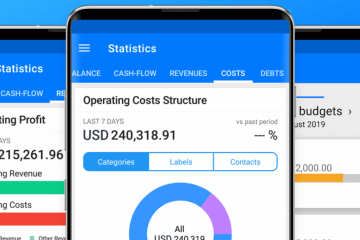Gauging Good Credit: What Is A FICO Score?
Many business owners wonder if a FICO score applies to them.
Let’s get started with the basics – what is a FICO score? Essentially, it’s a score which determines your credit risk and candidacy in the eyes of various lenders.
Today, we’ll dive into the world of FICO scores, how they are determined, and the role they play in your success.
What Is A FICO Score?
Created by the Fair Isaac Corporation (FICO), a FICO score is a type of credit score which evaluates the state of your credit. This gives financial institutions the opportunity to assess and determine if you are a strong candidate for lending opportunities.
These scores are primarily used by lenders, credit card companies, and insurance providers. As a general rule, if you have a high score you will gain access to credit at competitive rates.
If your score is less than average, you may receive higher rates. If it’s even lower, you may be denied outright for lending opportunities – severely restricting your access to capital.
Depending on the lender, some will make it very clear the optimal score they consider to lend to someone. If you are just starting an application, this is ideal to know before beginning.
Knowing your score, and how to make it even stronger, is essential to your business’ ability to gain access to capital, to grow, and to do so in a sustainable way.
Determining Your FICO Score
So, what goes into determining a strong FICO score?
There are five essential areas which blend together to determine your FICO score:
- Payment History (35%)
- Current Debt Levels (30%)
- Types of Credit Used (10%)
- Credit History (15%)
- New Accounts (10%)
A healthy mix of credit is imperative to not only the health of your business, but its overall longevity. Please feel free to read our blog about that to get a good idea on how to diversify and strengthen your credit.
It’s important to get a good understanding of each of these, so let’s break them down in terms of how they influence your score…
Payment History
This is determined by making your payments on time. When you have a line of credit, detailed reports are kept to report when you made payments.
Learning how to manage your business’ credit cards is an essential skill. We profiled some of the best ways to do, which you can learn for yourself right here.
This includes if they are late, or missed entirely, and just how late they were (typically in terms of days).
Current Debt Levels
How much do you currently owe? Your FICO score will not be determined necessarily by the amount, but how much of that credit you are currently accessing.
The ratio is important here, because having access to credit is a far greater look than maxing out all of your accounts.
Types of Credit Used
In order to bolster your FICO score, you will need a strong mix of credit. This would include retail accounts, different credit cards, loans, and mortgages.
A healthy mix, along with on-time payments, can be your key to a high FICO score.
Credit History
The long someone has credit on their file, the better their score (or the most impactful their score looks).
A FICO score will not only look at the accounts you have, but how long the oldest account has been open and the age of the newest account. The timeline of your accounts plays a pivotal role here.
New Accounts
Your FICO score will suffer if you have opened a selection of new accounts in a short period of time.
Your score benefits from opening accounts on a long enough timeline, with space in between to downplay risk and increase your attractiveness to potential lenders.
Understanding Your FICO Score
FICO scores range between 300 and 850.
Typically, scores above 650 indicate a very good credit history. Below 620, though, business owners can find it very difficult to access credits at rates friendly to their cash flow.
Let’s look at it like this:
- Under 580 – This is a score denoting a high level of risk
- 580 – 669 – Below average but only mildly risky
- 670 – 739 – This is considered a good score
- 740 – 799 – Above average and low level of risk
- Over 800 – Far above average – a fantastic borrower
Can FICO Scores Change?
The short answer is yes, but only if you pay attention and take care of your finances.
First, it’s important to know that there are different kinds of FICO scores. There is a baseline score which is utilized across various industries, followed by industry-specific scores which only apply to certain products.
That said, the way FICO scores are determined often changes. They are models which are consistently re-developed to help factor in everything a candidate may be doing (or not doing) to optimize their credit mix.
For context, most lenders are using somewhere between model 8 and 9 of the FICO score system. While the differences between the two may be small, there are nuances which can change scores as models evolve.
Ultimately, no one’s credit score remains low, or high, indefinitely. Your FICO score also has the opportunity to change with the times (along with your finances).
As we mentioned before, both your personal and business habits determine your score in the long-term – if you continuously pay down your debt, maintain strong ratios, and open new accounts (but not too often), your FICO score is going to grow higher and higher.
Do Banks Only Use FICO Scores?
A FICO score is not the only thing which will determine your credit risk.
Most FICO scores include a combination of both personal and business credit, so they are not always the most relevant in terms of small-business owners.
In fact, there are a whole host of other factors which help develop your candidacy. They include:
- Your Income
- Business History
- Type of Credit Requested
The fact is that more banks use your FICO score than any other metric, so it is important that this score is the best representation of yourself.
Having a low FICO score can handicap your business, in certain scenarios, before you even try to get off the ground.
Increase Your Score Using BOARD
The best way to build up your FICO score comes down to your habits.
If you have a solid understanding of where your money comes in, where it goes, and how to make payments consistently and on time, you are better able to set up your business for long-term success.
That’s why BOARD is here to help.
Your small business is only going to be as successful as your processes and how you track success. Learn more about how BOARD helps and start your own free trial today to give your finances the advantage they deserve.
Find it on the App Store or Google play or try our WebApp.


